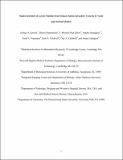Rapid Selection of Cyclic Peptides that Reduce Alpha-Synuclein Toxicity in Yeast and Animal Models
Author(s)
Lindquist, Susan; Caldwell, Guy A.; Caldwell, Kim A.; Naumann, Todd A.; Santagata, Sandro; McCaffery, J. Michael; Hamamichi, Shusei; Kritzer, Joshua A.; ... Show more Show less
Downloadmain article (1.268Mb)
OPEN_ACCESS_POLICY
Open Access Policy
Creative Commons Attribution-Noncommercial-Share Alike
Alternative title
Rapid selection of cyclic peptides that reduce alpha-synuclein toxicity in yeast and animal models
Terms of use
Metadata
Show full item recordAbstract
Phage display has demonstrated the utility of cyclic peptides as general protein ligands but cannot access proteins inside eukaryotic cells. Expanding a new chemical genetics tool, we describe the first expressed library of head-to-tail cyclic peptides in yeast (Saccharomyces cerevisiae). We applied the library to selections in a yeast model of alpha-synuclein toxicity that recapitulates much of the cellular pathology of Parkinson's disease. From a pool of 5 million transformants, we isolated two related cyclic peptide constructs that specifically reduced the toxicity of human alpha-synuclein. These expressed cyclic peptide constructs also prevented dopaminergic neuron loss in an established Caenorhabditis elegans Parkinson's model. This work highlights the speed and efficiency of using libraries of expressed cyclic peptides for forward chemical genetics in cellular models of human disease.
Date issued
2009-07Department
Massachusetts Institute of Technology. Department of BiologyJournal
Nature Chemical Biology
Publisher
Nature Publishing Group
Citation
Kritzer, Joshua A et al. “Rapid selection of cyclic peptides that reduce [alpha]-synuclein toxicity in yeast and animal models.” Nat Chem Biol 5.9 (2009): 655-663.
Version: Author's final manuscript
ISSN
1548-7105
1552-4450